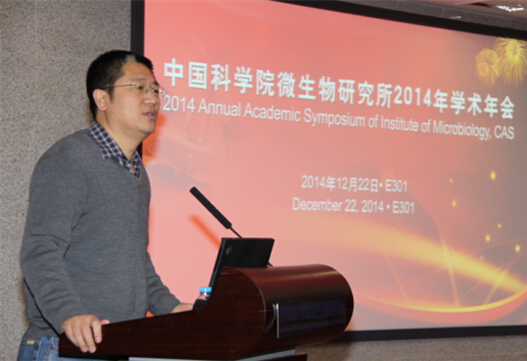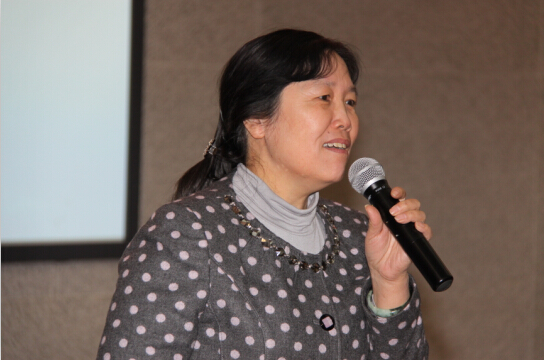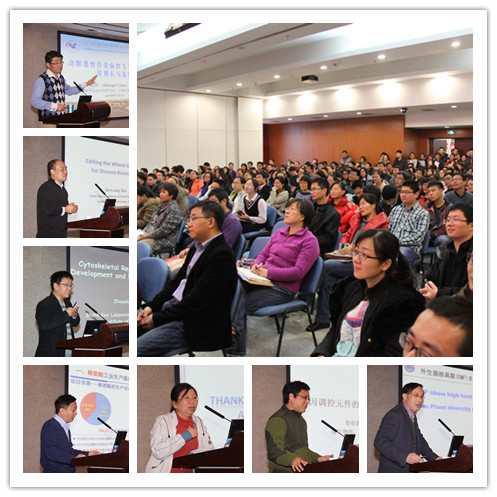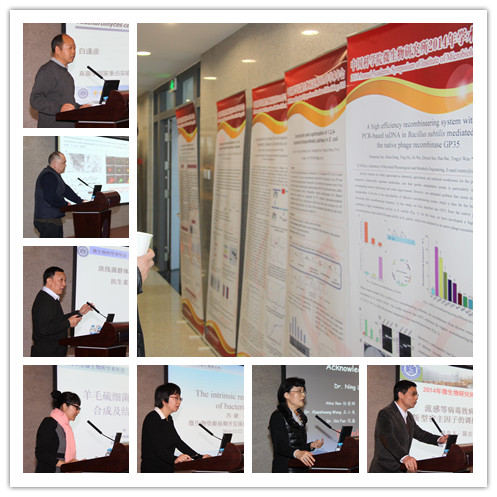2014 Annual Academic Symposium of Institute of Microbiology, Chinese Academy of Sciences (IMCAS) was held on December 22, 2014 in Beijing. The symposium attracted over 400 attendees. LIU Shuangjiang, Director-General of IMCAS addressed the symposium. He said the annual meeting was highlight of the year and the platform of introducing the research progress. He hoped IMCAS researchers would strengthen their cooperation and make further preparation for the strategic development of the institute.
GAO Fu, CAS academician, delivered his speech on Occurrence and Control of Animal-borne Diseases: Ebola and Influenza. He briefed the infection mechanism and transmission routes of Ebola and influenza virus and what he had seen in Ebola epidemic area in Sierra Leone.
QIU Jinlong and KONG Zhaosheng from State Key Laboratory of Plant Genomics introduced their research progress. QIU demonstrated that both TALEN and CRISPR/Cas9 are efficient at mutating genes in wheat and they obtained healthy crops using these techniques. KONG showed the dinamic formation process of microtubules using Live Cell Imaging in Arabidopsis.
WEN Tingyi, TANG Shuangyan and LOU Chunbo presented their work in CAS Key Laboratory of Microbial Physiological and Metabolic Engineering. WEN’s team did the strain engineering to increase the productivity of amino acids, such as lysine, threonine and serine. TANG’s team designed a novel high-throughput screening technique for 1-Deoxynojirimycin, which is an alpha-glucosidase inhibitor relevant to the pharmaceutical industry. LOU told a story of modular design of transcriptional regulatory parts.
GUO Liangdong, BAI Fengyan and JIANG Xuejun introduced their researches in State Key Laboratory of Mycology. GUO introduced the maintenance mechanism of biodiversity of mycorrhizal fungi in forests of subtropics. BAI explained why the glucose repression in S. cerevisiae in kumiss is removed to adapt the interacions with lactic acid bacteria. JIANG introduced the influence of small molecules to autophagy in cell.
TAN Huarong, ZHONG Jin and FENG Jie from State Key Laboratory of Microbial Resources introduced their work. TAN introduced his recent progress in GBL (gamma-butyrolactones)-directed antibiotics biosynthesis and regulation. ZHONG detailed the biosynthesis and regulation of lantibiotics-one type of small peptide with the broad-spectrum antibacterial activity. FENG investigated the intrinsic resistome that give bacteria natural resistance to antibiotics.
WANG Beinan and CHEN Jilong from CAS Key Laboratory of Pathogenic Microbiology & Immunology showed their progress in the area of virology. WANG explained how influenza infection primes bacterial co-infection through TGF-mediated expression of host cell receptors. CHEN elucidated how the infection of influenza could cause cytokine storm.
DONG Xiuzhu, Deputy Director-General made the closing remark, saying the symposium showed the research progress of IMCAS in 2014 and it promoted the mutual understanding of researchers and laid the foundation for cross-disciplinary collaboration.

LIU Shuangjiang,Director-General of IMCAS Delivered a Speech

DONG Xiuzhu,Deputy Director-General of IMCAS Hosted the Symposium

Researchers Introduced Research Progress in 2014

Researchers Introduced Research Progress in 2014